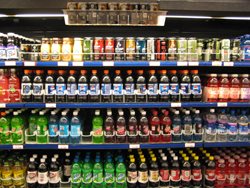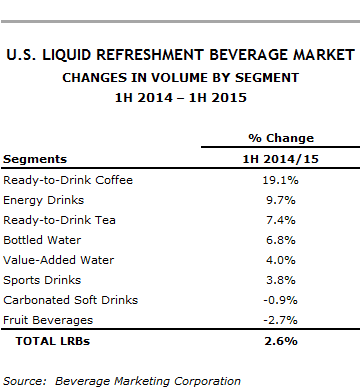The Beverage Industry’s Surge in Healthy Drinks

While 20 or 30 years ago this aisle would have been made up of over 90% soda and other carbonated beverages with high amounts of sugar, the 2015 beverage aisle is a combination of different still and sparkling bottled waters, flavored coconut waters, low calorie teas, coffee and espresso-based beverages, as well as the traditional carbonated soft drinks. In addition, there are new age healthy beverages, such as kombucha, raw root and vegetable juices, and herb-based low calorie energy drinks. Every week, a new beverage will seemingly emerge and suddenly become the popular drink for a month or two, which is then replaced by the next fad beverage.

A perfect example of this phenomena is the advent of flower-based beverages, with new brands appearing almost daily to reap the potential profits among healthy-minded American consumers. Flowers, like herbs and many other plants, have been a dietary staple in numerous cultures, serving both for flavoring and healing purposes. Blossom Water, a small beverage company opened in 2013 to target the consumer shifting away from high sugar carbonated soft drinks, is one of a growing number of floral-flavored beverages being stocked in supermarket shelves. Blossom Water offers four flavors, including lemon rose, plum jasmine, grapefruit lilac, and pomegranate geranium. Upon close inspection, it seems many drinks today are advertised based not on what they contain, but what they don’t contain. These drinks are advertised as, “100% natural, no preservatives, artificial sweeteners or colors, non-GMO, low glycemic, sodium and caffeine free, gluten free, vegan, with glass and not plastic bottled packaging.” While companies hint at the possible health benefits offered by their products and confirmed via thousands of years of historical records in Eastern cultures, they make no guarantees, as they must be careful to not overstate their product’s health benefits. Their products could risk becoming a drug liable under the FDA’s scrutiny and standards, with a high degree of scientific evidence required as proof and an average price tag ranging from $50 to $500 million for FDA-approval.
This upsurge in healthy drink purchases across the United States can be directly linked as the primary factor of soda sales dropping nationwide—as of 2014, soda sales have been decreasing steadily. Coca-Cola and Pepsi, the two largest soda manufacturers nationwide, each posted modest declines as well: total soda volume dropped by 0.9% from 2013, with Pepsi posting a 1.4% volume drop, and Coca-Cola reporting a 1.1% decrease. As America strives to get healthier and healthier, we in the assets liquidation industry can certainly expect to see an increase in soda and soft drink manufacturing plants being closed and listed as for sale.
